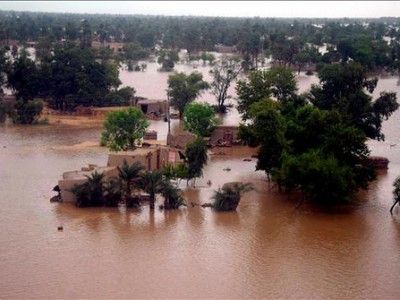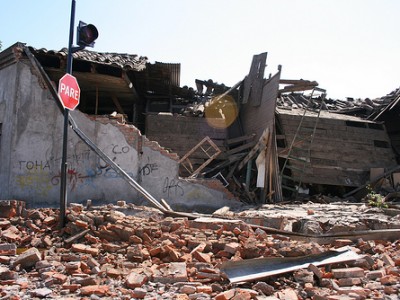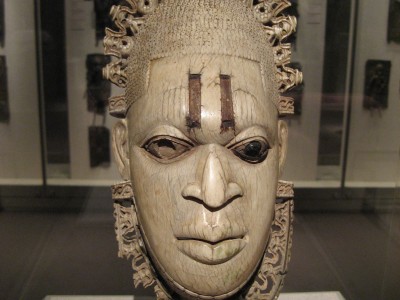Stories about Arts & Culture from December, 2010
Russia: Internet 2010 Overview
2010 highlighted several important trends of Russian Internet. Online audience grows very fast with people getting more news online and actively using social networks. In a lot of ways, 2010 brought a recognition of the power of the Internet into Russian society.
North Korea's State-run TV Broadcasted its First Western-made Film
North Korea's state-run television broadcasted its first Western-made film, a heavily edited “Bend It Like Beckham”. The British soccer film contains North Korea's taboo topics, like interracial relationships, homosexuality and religion. British Embassy in Seoul tweeted it is ‘the first western live-action film ever aired in North Korea, arranged by...
New Year's Resolution: Learn About Latin American Culture
Colombian/Argentinean Travelojos contributor Jennifer Lubrani writes about her New Year's resolution: “I’ve made it a goal to try to learn as much as I can about all of the other Latin American cultures.” She suggests five ways to “get cultured” on Latin America.
Japan: Top popular Japanese phrases of 2010
Pinktentacle reported and translated into English the “Top 60 popular Japanese words/phrases of 2010″, published on the website of Jiyu Kokuminsha.
Glimpses of Citizen Media from Portuguese language countries in 2010
Throughout 2010 the lusophone blogsphere has given new perspectives on important issues that mainstream media tends to ignore. Read this post and discover a selection of the voices that Global Voices has amplified - from citizen media phenomena, to politics, governance and indigenous peoples.
South Asia: Looking Back at the Citizen Media Storylines in 2010
You cannot leave South Asia region out of the picture as with nearly twenty three percent of the world's population, events in this region exert an enormous impact on the international system. Global Voices covered some of these events from a citizen media perspective. Let us review the popular posts of 2010 in this region.
Africa: 15 African Breakout Artists of the Year
Ladybrille's 15 African breakout artists of the year: “2010 has been a terrific year for African music and its music industry. As a quick recap, the first World Cup held on African soil put African music center stage in the homes of millions…”
Africa: Looted African artefacts belong to Africans
Sign an online petition that has been created to build on a recent petition to stop an auction house, Sotheby’s from selling a 16th Century Benin Mask.
Latin America: 2010 in Review
An 8.8-magnitude earthquake in Chile, a police strike in Ecuador and the Nobel Prize in Literature for Peruvian author Mario Vargas Llosa were some of the news bloggers and citizen media users reported and analyzed this year. Let's take a look at these and other stories the Latin American team covered in 2010.
Nigeria: Controversy Over the Sale of Stolen Benin Mask
Online activists have been protesting against the proposed auction of six pieces of stolen artworks including the mask of Queen Idia – the first Queen Mother of Benin, Nigeria.
Bahamas: Junkanoo colours
Bahamaboy posts images of Junkanoo — the traditional year-end masquerade celebrated in Nassau and other parts of the Bahamas — at Flickr.
Russia: Informal Medvedev Election Trailer Realeased Online
An anonymous user created a short à la Guitar Hero video trailer jokingly presenting Dmitry Medvedev as “President Hero 2012.” The video draws attention to the upcoming 2012 presidential elections in Russia.
Bahamas: Patience for Junkanoo
“During the Christmas and New Year period, little else animates Bahamians than showing vociferously where there hearts are in support for the groups that grace the annual street parades”: Grasshopper Eyes The Potomac blogs about Junkanoo.
Japan: A year of blogs
As the character 暑 (sho) meaning ‘hot or heat' was chosen to represent the year 2010 at the annual ceremony in Kyoto, let's see a selection of “hot topics” that Global Voices covered this year.
Nigeria: Sotheby’s cancels sale of Benin’s stoles Mask
An update on the proposed sale of stolen masks from Nigeria: “Many thanks to all MyWeku readers and the 3000+ Members of the Connoisseurs of Contemporary African Art group who signed the online petition, tweeted and shared the planned sale of the “Queen of Idia” mask on various social media...
Russia: How Vladivostok Christmas Tree Craziness Made Me Laugh
People in Vladivostok never lose their sense of humor. Otherwise one would be in the perpetual state of depression. They laugh about everything from nerve-racking traffic jams and alarming snow situations to Christmas tree arrangements and new taxes on the imported Japanese cars.
Morocco: Young Talent Caught on Tape
Karim Boubker is a young Moroccan Vlogger and social media enthusiast. Here, he films a young musical talent he is fond of, Sarah Ariche.
USA: Indigenous Youth Media Project Recovers History
For a Navajo community, video has become a way to connect youth with their ancestors and the history of their people through the story of the Yellow Woman.
India: Aishwarya Rai In Skin Lightening Controversy
Pickled Politics writes about the latest controversy of Bollywood actress Aishwarya Rai Bachchan, where she appears to have had her skin whitened for a photoshoot for Elle magazine.
Russia: Is Internet Guilty of Organizing Nationalistic Riots?
Russian media and blogosphere ponder who is responsible for the nationalists’ riots in Moscow in mid-December. But the authorities found their own scapegoat – the Internet.
Morocco: Rare Recording of Popular Jewish Song
Chris Silver, writing on Jewish Morocco, shares a rare recording in this post. It's a song by Haim Abitbol, from the time when Moroccan Jews performed popular music.









